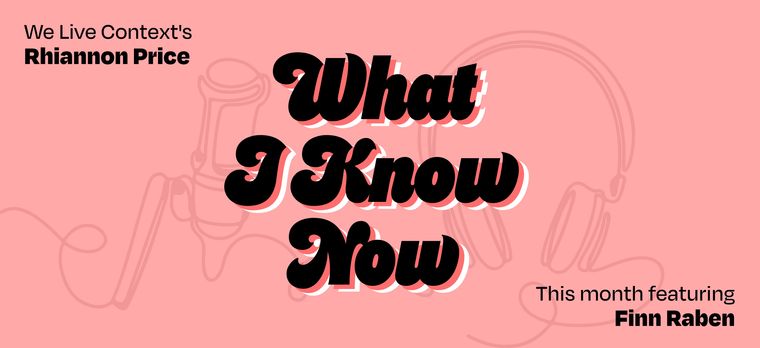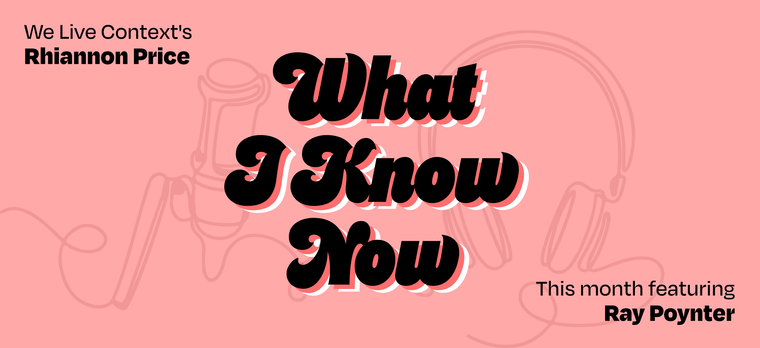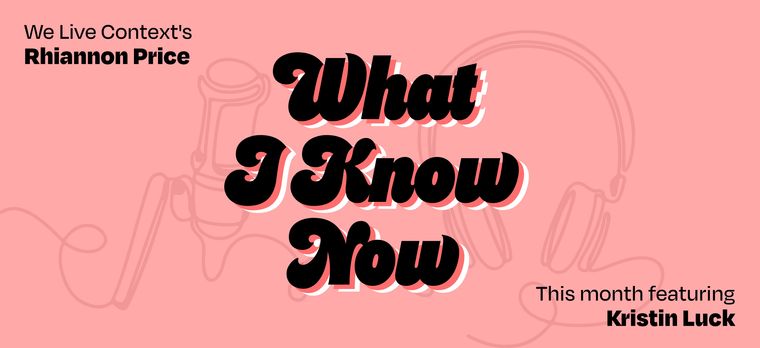What I Know Now... Lucy Davison
Every month Rhiannon Price asks some familiar faces in the MRX world what they have learned about themselves and their industry. This Month we've got Lucy Davison - Founder of Keen as Mustard Marketing, MRS Fellow and former ESOMAR council member.
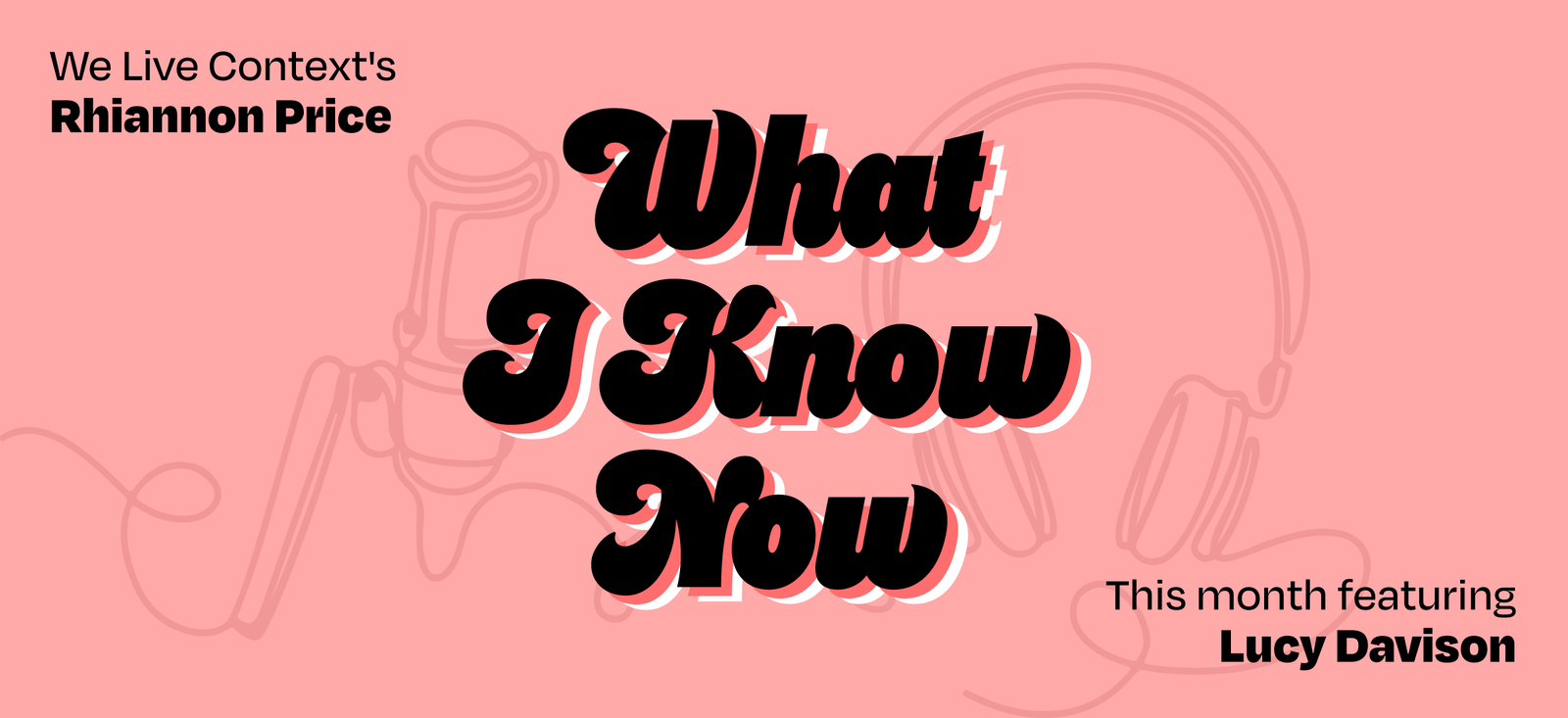
Each month, We Live Context’s Rhiannon Price asks some familiar faces in the MRX world what they have learned about themselves and the industry on their journey so far.
I’m lucky enough to have interviewed some super interesting people throughout my career. People from all over the world. People from all types of professions. People from many different backgrounds. I’ve spent days in their company taking it all in. I’ve seen them laugh, cry, and get angry about the twists and turns their path has taken them on. Be it a South African entrepreneur in Soweto or a Saudi millionaire, I have learned a lot about how people get to where they are going and their advice for life. But until recently, I have never really turned the lens inward. I have never asked my peers or the people I most admire in market research what their advice for life is. How they got to where they are. How they see things. But when I did, I found it wonderfully inspiring and not only a little bit transformative.
And so, I thought it was about time that we celebrated the wisdom of our MRX crowd and let their stories inspire us.
This month I spoke to Lucy Davison, Founder of Keen as Mustard Marketing, MRS Fellow and former Council member of ESOMAR, who explained why she doesn’t really understand Imposter Syndrome, why it’s so important to listen and why she’s only ever read one business book.
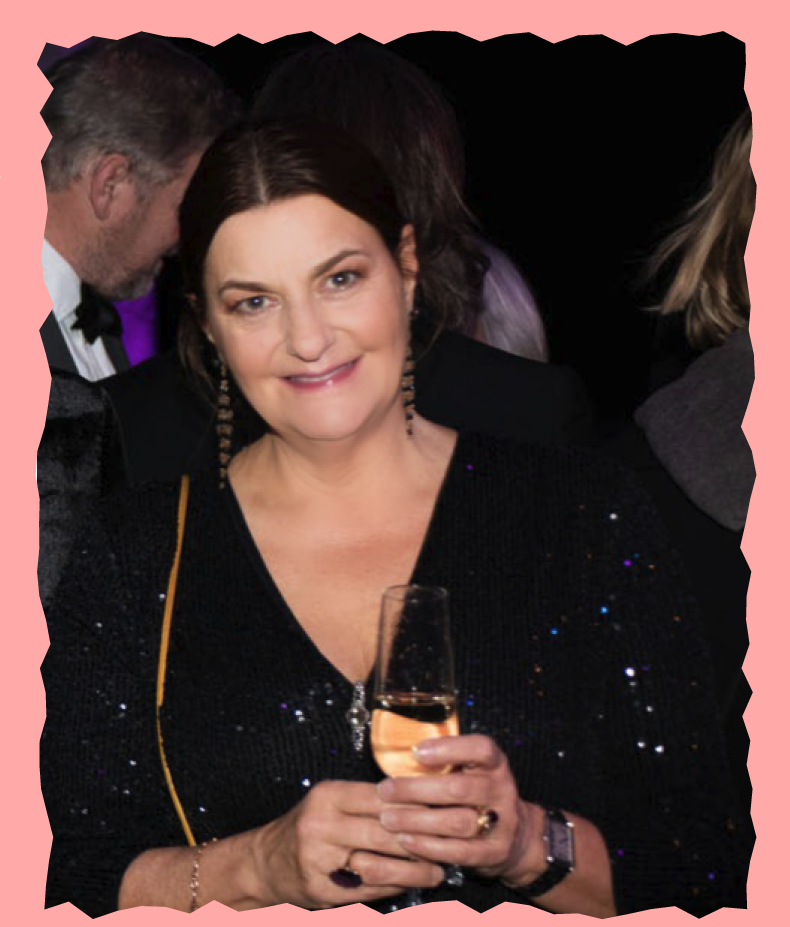
Let’s start like we mean to go on with the “big one at one”…Are you where you thought you would be at this point?
It depends when you asked me that question! At school I thought I'd be a novelist. And actually, I look back at my school yearbook and I was the person voted most likely to win a Pulitzer Prize. But then of course, I realised you need to earn money to live, and that was a moment of shock. I was also interested in architecture and design, so if you’d asked me later then I would have thought I’d be running a design company or branding agency. And that's pretty much what I did for the first 10 years of my career before I got into research. I worked as a consultant and had a portfolio career without realising, because people hadn’t called it that then.
So what got you into the world of MRX?
I used to commission research as a way of getting content to write about, but it never occurred to me to work in market research, not in a million years.
Then in 2000, I was offered a job at Research International, as the Marketing Director, to do a global rebrand. So, I was kind of poacher turned gamekeeper, which was brilliant. I absolutely loved it there and I fell in love with research and insight. I spent a lot of time packaging up methodologies and tools, and forcing people to think about them from a marketing point of view. I made everyone stop being descriptive, and start being benefit led and client focused.
And I did lots of travel, which was fabulous especially when we had small children, because I could sleep! And they have a father, you know? So, he could look after them for a change. I mean, I was also giving vast sums of my salary to a nanny - it was like having a wife. Which was also fantastic.
I don't want this to be a gender conversation, but I think it's somewhat inevitable when someone's been as successful as you are to think about everything that comes with being a woman and a mother in business. Is there anything about this that you can reflect on?
Well, yes, lots of things. First of all, I wanted to be a good role model for my daughters. Also, I was flat out, but that didn't mean I didn't make all the sports days and all the music performances and all the ballet classes, I was still doing all that. I was just absolutely flat out. And so, you just have to be unbelievably buttoned down, which luckily, I am. I'm extremely, disciplined and organised. And I do have a very strong ability to flick a switch in my head, so I don't think about work when I'm doing home things.
What? Never?!
No. Literally never, and I've always been very clear about the parameters of that. I've always worked a four-day week because I need that. Even when my kids went to university and I had no excuse anymore, I need that time for me. And as a result, I'm much more creative and productive. I have never admired somebody who works long hours just because they worked long hours. Which is why I like employing mothers. Because they have a deadline, you know, nursery finishes at 5 and they've got to get there!
We hear people talking about ‘imposter syndrome’. Is this something you’ve ever felt and how do you boost your self-confidence to overcome self-doubt and criticism?
I've never really had that. I don't really understand it.
What about ever doubting your career path?
I've always doubted my career path, because I didn't have a career path. I just did the next thing that I thought sounded interesting. So, I don't get imposter syndrome because I don't actually have a sense of where I'm supposed to be.
So, you are genuinely telling me there are no points when you sit there and you go “Wow, I'm out of my depth”?
No. I can't think of a single time when I felt out of my depth. I just wouldn’t ever get myself into a situation when I thought “Oh my God, what am I doing here?”, which in some ways means I'm obviously playing it super safe.
I’m really interested in your entrepreneurial spirit and the fact that you founded your own business Keen as Mustard Marketing in 2006. What type of agency were you trying to create?
Well, obviously because we wanted to do strategy, brand identity and design, I wanted a really good brand. So, the name and visual identity were really important, because that's our showcase, right? You can't have a bad name like Davison Associates and go out and do naming because you know, you're obviously not very creative.
Fundamentally, I founded the company because I could not find agencies to support me when I was a marketing director. The PR or creative agencies we tried did not understand research and data. It’s much more sophisticated than doing B2C or even most other B2B marketing work.
In setting up your own business, was there an element of not wanting to work for ‘the man’?
Oh yeah, I've always thought I was a little bit unemployable because I always tend to think I know better. Obviously, I'm very careful not be too arrogant. But at the same time, I've done a lot of listening and I've learned a lot. But there are very few people who I've wanted to work for.
Haha, so how do you navigate always thinking you know better?
It's very, very hard. 95% of it is about communication. For example, when you're doing a global rebrand, you have to take people with you. You have to get yourself in a position of having other people think it was their idea. And I've got quite good at that. I often minimize myself in a situation, so I've often said “ohh I don't really understand how this works, can you explain it?”. Then I often see people haven’t thought it through most of the time, right? They haven't thought through how they're going to communicate that thing to a person who has no clue what it is about. Then I can ask the key question – why? And then they tell me rather than me or the company imposing it.
What are your top tips for insight agencies to make themselves as marketable as possible?
The most important thing is to know what you're good at and to focus on that, and to articulate that from a client perspective and in a way that is fresh and brand relevant. Differentiation is a big problem for a lot of companies because they're in a very crowded market. There are lots of different ways to be different, but it is important that you are different. And then another key aspect is that design or content or any of that kind of stuff should never be personal. It should be the right solution for the situation. It can’t be a likeability fest.
Among other industry contributions, you’ve been involved with ESOMAR since 2015, and you are an MRS Fellow, why is it important to you to be involved in the industry?
It is my industry! It's like looking after your family. I mean, you have to. You absolutely get out what you put in. Before I worked in research, when I was in the design industry, I was very involved with the Design Effectiveness Awards with the Design Business Association. I founded something called Women in Marketing and Design back in about 1990. I've always been one of those people that feels they need to get stuck in and involved. Also, if you want to change things you have to be involved with it. You can't just sit back.
Can you share some meaningful and well-timed advice that you've received over the years?
I was lucky to have a father who was a very successful business person and ran several very big companies. Once I was a bit worried about having meetings with the Finance Director at RI as I was a bit concerned that the guy would try and bamboozle me and then take my budget away. So, I spoke to my father and he said, “well, go in with your budget and your plans and present it to him, but don't let him take the lead.” And it’s true, in my experience, if you're the person who puts the offer in the ring, you're more likely to get closer to what you want than if you wait for somebody else to do it first.
Then, not a specific piece of advice, but John Wilkinson, who was the CEO of RI for most of the period I was there, was such a good listener and really taught me the power of listening. I talk a lot, so it's really hard!
And what about a piece of advice you disagree with?
I'm not a fan of most business books. I think they're written for five-year-olds and people with the attention span of a gnat – life is too short to read business books. The only one I recommend is: “Tales from Wall Street” by John Brooks - 12 chapters of stories about when people had done really dumb things in business. “The best business book ever written” according to Bill Gates. It was hilarious!
And to end on some quick fire recommendations for personal and professional development…
If you read just one book…?
Middlemarch, by George Eliot. That's the only book anyone ever needs to read. You can learn more about how to run a business than from any business book. It's about listening to people, engaging with people and not being narrow minded. Not just pushing through with what you think is the right thing to do.
If you listen to just one podcast…?
I listen to mountains of podcasts. I am a bit obsessed with Tim Harford, I love his “Cautionary Tales” as well as “More or Less”. He does a great job of using the data to tell the story. I’m also very into history at the moment - Gone Medieval, or Dan Snow does a daily history podcast called History Hit which is brilliant.
If you follow just one person…?
That's very difficult, but I’m a big fan of Hannah Fry. If I’d had a maths professor like that I think my life might have been very different!
And you remember just one thing?
People don’t remember what you said, but how you made them feel. So, I'm a very big fan of trying to be kind and paying it forwards. I will say thank you. I just think it's really, really important.
